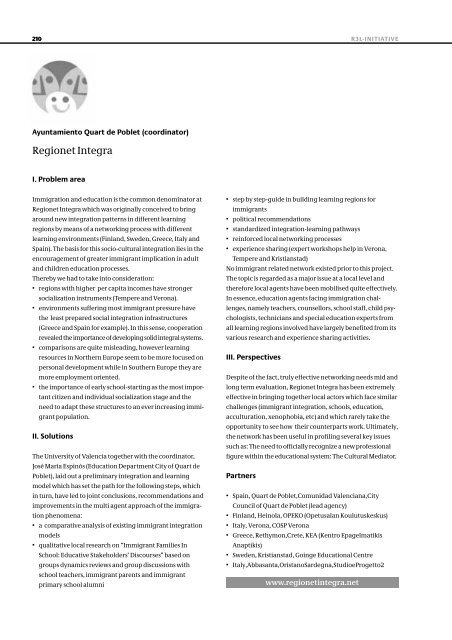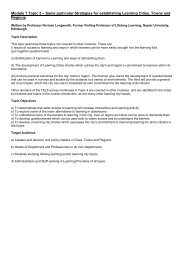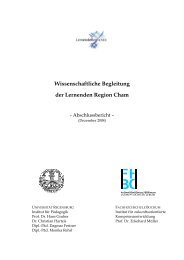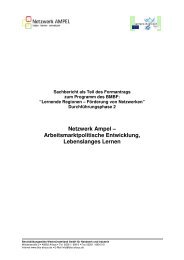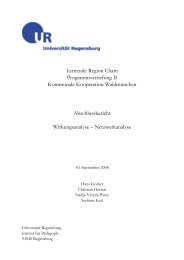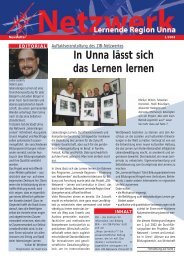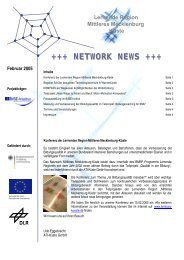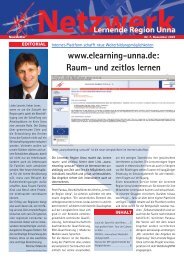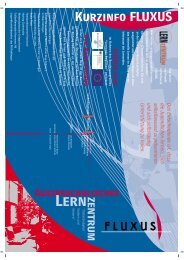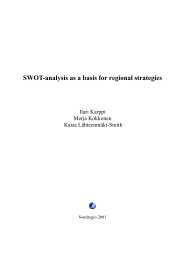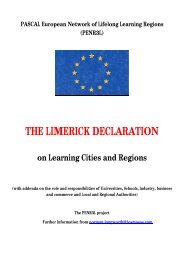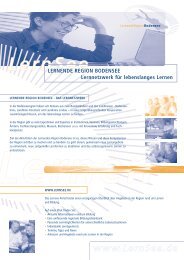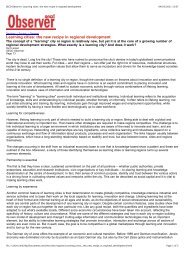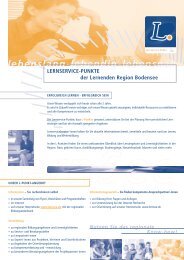Die Strategie für das Lebenslange Lernen ... - EUROlocal
Die Strategie für das Lebenslange Lernen ... - EUROlocal
Die Strategie für das Lebenslange Lernen ... - EUROlocal
Erfolgreiche ePaper selbst erstellen
Machen Sie aus Ihren PDF Publikationen ein blätterbares Flipbook mit unserer einzigartigen Google optimierten e-Paper Software.
210 R3L-INITIATIVE<br />
Ayuntamiento Quart de Poblet (coordinator)<br />
Regionet Integra<br />
I. Problem area<br />
Immigration and education is the common denominator at<br />
Regionet Integra which was originally conceived to bring<br />
around new integration patterns in different learning<br />
regions by means of a networking process with different<br />
learning environments (Finland, Sweden, Greece, Italy and<br />
Spain). The basis for this socio-cultural integration lies in the<br />
encouragement of greater immigrant implication in adult<br />
and children education processes.<br />
Thereby we had to take into consideration:<br />
• regions with higher per capita incomes have stronger<br />
socialization instruments (Tempere and Verona).<br />
• environments suffering most immigrant pressure have<br />
the least prepared social integration infrastructures<br />
(Greece and Spain for example). In this sense, cooperation<br />
revealed the importance of developing solid integral systems.<br />
• comparisons are quite misleading, however learning<br />
resources in Northern Europe seem to be more focused on<br />
personal development while in Southern Europe they are<br />
more employment oriented.<br />
• the importance of early school-starting as the most important<br />
citizen and individual socialization stage and the<br />
need to adapt these structures to an ever increasing immigrant<br />
population.<br />
II. Solutions<br />
The University of Valencia together with the coordinator,<br />
José María Espinós (Education Department City of Quart de<br />
Poblet), laid out a preliminary integration and learning<br />
model which has set the path for the following steps, which<br />
in turn, have led to joint conclusions, recommendations and<br />
improvements in the multi agent approach of the immigration<br />
phenomena:<br />
• a comparative analysis of existing immigrant integration<br />
models<br />
• qualitative local research on “Immigrant Families In<br />
School: Educative Stakeholders’ Discourses” based on<br />
groups dynamics reviews and group discussions with<br />
school teachers, immigrant parents and immigrant<br />
primary school alumni<br />
• step by step-guide in building learning regions for<br />
immigrants<br />
• political recommendations<br />
• standardized integration-learning pathways<br />
• reinforced local networking processes<br />
• experience sharing (expert workshops help in Verona,<br />
Tempere and Kristianstad)<br />
No immigrant related network existed prior to this project.<br />
The topic is regarded as a major issue at a local level and<br />
therefore local agents have been mobilised quite effectively.<br />
In essence, education agents facing immigration challenges,<br />
namely teachers, counsellors, school staff, child psychologists,<br />
technicians and special education experts from<br />
all learning regions involved have largely benefited from its<br />
various research and experience sharing activities.<br />
III. Perspectives<br />
Despite of the fact, truly effective networking needs mid and<br />
long term evaluation, Regionet Integra has been extremely<br />
effective in bringing together local actors which face similar<br />
challenges (immigrant integration, schools, education,<br />
acculturation, xenophobia, etc) and which rarely take the<br />
opportunity to see how their counterparts work. Ultimately,<br />
the network has been useful in profiling several key issues<br />
such as: The need to officially recognize a new professional<br />
figure within the educational system: The Cultural Mediator.<br />
Partners<br />
• Spain, Quart de Poblet,Comunidad Valenciana,City<br />
Council of Quart de Poblet (lead agency)<br />
• Finland, Heinola, OPEKO (Opetusalan Koulutuskeskus)<br />
• Italy, Verona, COSP Verona<br />
• Greece, Rethymon,Crete, KEA (Kentro Epagelmatikis<br />
Anaptikis)<br />
• Sweden, Kristianstad, Goinge Educational Centre<br />
• Italy,Abbasanta,OristanoSardegna,StudioeProgetto2<br />
www.regionetintegra.net


